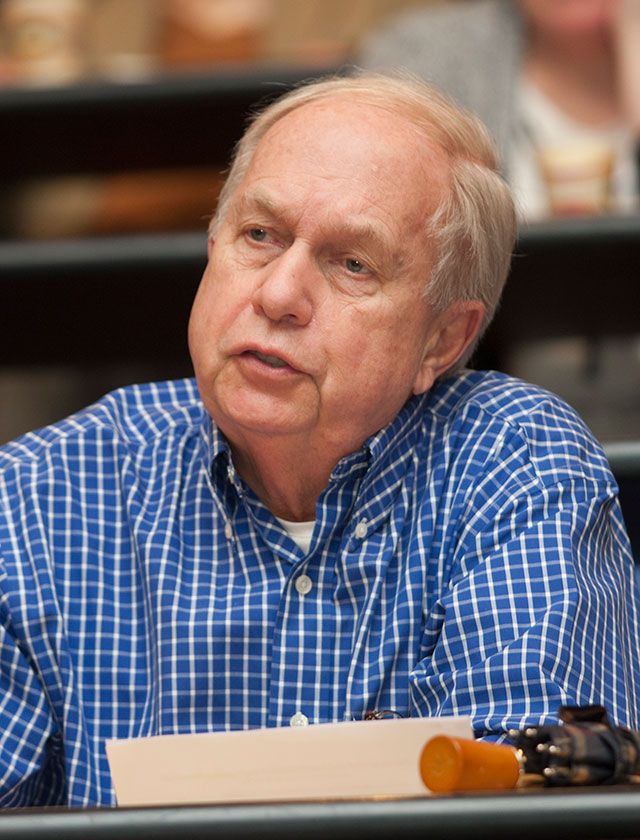The structural engineering professor remembers his 36 years of teaching, research, and service on South Mountain.
"Am I a traditional structural engineer? Not quite. Am I proud of that? Yes," says John Wilson, professor emeritus of structural engineering.
Wilson retired from active teaching at the end of 2017, and looking back on his 36 years of service to Lehigh and its civil and environmental engineering department, he remembers especially fondly the times when his skills and unique perspective on his field advanced the department’s reach in the classroom and the research lab.
This perspective often allowed him to think about things differently. It allowed him to contribute greatly to projects large and small, including the development and implementation of the CAE Lab and the ATLSS Engineering Research Center.
One summer evening in the mid-1980s, Wilson was sitting with his colleagues Al Pense and Peter Mueller discussing their ideas for new computer tools and research processes at a potential NSF-funded research center at Lehigh.
"And it just came to me. The focus of the research was large structural systems, and the application was advanced technology," Wilson says. "As soon as I put it together in my head, I said, ‘We should call this ATLSS,’ and after I said it, we all knew it was a potential winner right away."
He was right. Lehigh was competing with 146 other schools for an NSF Engineering Research Center (ERC), and Lehigh (ATLSS) won an NSF award.
Wilson says there are several highlights in his career. First, serving as an associate director until the successful completion of the NSF-funded life cycle years, with John Fisher as the ATLSS Director, is among the highlights of his career. Second, is the way he transformed the civil and environmental engineering department’s computing infrastructure at a critical time for its continued excellence among peers. In addition, in 1992, he was honored to deliver the keynote address "Computing in Civil Engineering" to the National Academy of Engineers- another highlight in his distinguished career,
"After completing my Ph.D., I joined the faculty at the University of Pennsylvania from 1969 to 1978. Then, I worked in industry for four years at Sun Company," Wilson says. "At that point, I was ready to be back at a university, and Lehigh had created a new position which involved developing a computer-aided engineering (CAE) lab."
At the time, Wilson says, there were just a couple keypunches in Fritz Lab, and his focus on computer systems began to bring new potential for research and education to CEE. "A goal throughout my career was to develop new computer tools and research processes to integrate the phases of planning, design, construction, operation, maintenance, and renewal over the life of a facility," he says, "and the CAE lab and ATLSS were the first steps I took at Lehigh toward doing just that."
This was also a critical aspect of his research portfolio. "I’m proud to have worked on integrated design and construction programs and projects including artificial intelligence applications like the Designer-Fabricator Interpreter and the Bridge Fatigue Investigator with John Fisher," Wilson says, "as well as the ARCHQUAKE interface between structural designers and architects for earthquake resistant design with Peter Mueller."
After finishing his work at ATLSS, Wilson transitioned to the position of Director of Graduate Studies and Programs. He says he’s been honored to work in this capacity and help CEE grow across research and education areas. He expects the department and its new generation of faculty to further develop these areas. In terms of research, this means the successful development of tools to analyze and design complex large-scale CEE systems, and in education, he mentions increased laboratory experimentation on and simulation of large-scale systems and more studies on how to investigate and understand complex CEE systems.
More than anything else, however, Wilson says he values the relationships formed over his more than 36 years at Lehigh. "Human connections, the intellectual growth of students, and continuing friendship—that’s what sticks with me, what I remember most fondly," he says.
That includes mentoring individuals who, like Wilson, went on to use their civil engineering skills and education in unique and surprising applications. Among them are Stephen T.C. Wong, Ph.D., former Director of Bioinformatics at Harvard Medical School and the Founding Chairman for the Department of Systems Medicine and Bio-engineering at the Houston Methodist Research Institute and Chenggang Shi, Ph.D., Managing Director of the Risk Management Department at the China Investment Corporation which is a sovereign fund responsible for managing the People’s Republic of China’s foreign exchange reserves.
Wilson says, "Changing the way we look at problems, not just the manner in which we solve them, is my lifelong endeavor."
-John Gilpatrick is a freelance contributor to the P.C. Rossin College of Engineering and Applied Science.

